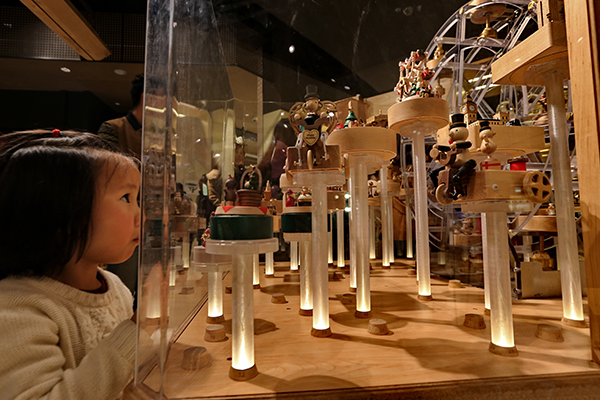 |
|
A girl tries her fingers at a chess-like board game designed to develop children's intelligence, at an Eslite bookstore in Suzhou, Jiangsu province. [Photo/China Daily] |
Many retailers of books reinvent business models to survive and thrive in spite of competition online
Every Saturday, accountant Liu Xincheng, 28, makes special efforts to reach the SiSYPHE bookstore in central Shanghai's Joy City, a commercial complex, earlier than other customers.
"You have to arrive there early in order to secure a (good) place to read or a seat in the cafe within the bookstore. After 1 pm, the entire place is fully occupied, and you have to line up for a seat, for browsing a shelf, and to pay at the counter," said Liu.
The bookstore is divided into three main sections: books area, cultural area and creative products area. In addition, there is a coffee area and a "public study" area for many young readers such as Liu.
"I even bring my date here. We don't talk much because everyone is reading, and each of us just reads the books we pick. But we don't have to buy. It feels good when you can relax, have some quality time, read something and learn something. It does not cost much," he said.
SiSYPHE is one of the scores of branded bookstore chains in China that has been trying to balance the need to be profitable with the urge to provide a book reader-/buyer-friendly environment.
Rents at prime commercial properties have been soaring so much in key cities that many bookstores had to close down. The survivors are juggling costs and benefits, trying to offer more products and services to supplement the high cost of, and low profits from, selling books.
 |
|
A little girl watches toys at Eslite's first bookstore on the Chinese mainland on its opening day in Suzhou, Jiangsu province, at the end of 2015. [Photo/IC] |
According to a research note from China Galaxies Securities, gross profit of book distributors is about 10 percent, while that on creative products such as notebooks, stationery, T-shirts and canvas bags could reach 50 percent, while bookstore cafes could see 75 percent margins.
Liu Gui, managing director of JIC Books Investment Ltd, a cultural investment arm of comprehensive investment group JIC Group, said bookstores have been undergoing an evolutionary transition. The 1,500-square-meter bookstore of JIC Books focuses on biographies of business figures, celebrities, statesmen and cultural icons, and hosts a cafe, a function room, a library and a gallery.
"The bookstore is more like a space that attracts people with shared interests, and they can talk, appreciate art, listen to music, and hold meetings. It can serve as a gallery that displays creative works, and it can offer space for forums and salon. It is no longer just a pure-play bookstore. It is 'bookstore plus', offering a comprehensive space for guests," said Liu.
In Hangzhou, JIC Books cooperates with a trust company to function as a "book plus financial" destination, or a community targeting guests who need wealth management services.
In Wuxi, the bookstore is located in a hotel, thus becoming a meeting spot for the "book plus tourism" community mainly comprising tourists. In Beijing, the bookstore opened in a lifestyle complex targeting retirees, adopting a "book plus lifestyle" model, said Liu.
"I believe if such models work well, more capital will enter the market to help bookstores grow," said Liu.
Bookstores worldwide have had a difficult time during the 2008 Global Financial Crisis, and have been recovering since the past two years, with some outperforming others. But all the market players have been pondering how they could battle the electronic books or e-books, online sales, and e-book readers... all these mean there are fewer readers and lower sales at brick-and-mortar bookstores.
Barnes & Nobel, the largest book retailer in the US, is going to open restaurants in bookstores. In the UK, book retailer chain Waterstones enables each of its stores to plan its specific lectures and reading events to meet demands from readers in various neighborhoods. In Japan, Daikanyama T-site hosts not only bookstores but a DVD library, a Starbucks coffee shop and even a pet care center.
Cheng Sanguo, CEO of BookDao.com, a publishing and book market intelligence information platform, said the future of bookstore is "X plus books".
"Reading is a solid demand but you don't have to read a book just in a bookstore. You can grab a book when waiting in a hospital, or choose a recipe when shopping groceries. I am quite impressed with the model that MUJI, a Japanese zakka-it's a fashion and design phenomenon-store, follows. In MUJI you have food, clothing, bedding, furniture, coffee and interior designs.
"Buyers of these can always extend their shopping to lifestyle books. This is what we call the 3.0 version of a bookstore. If investors are interested in entering the book distribution market, bookstore 3.0 is a good option," said Cheng.
